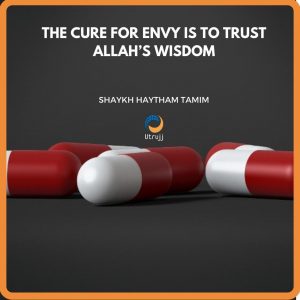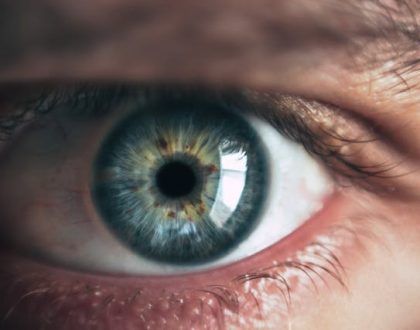(4:32) Hasad: How to Avoid Envy

by Umm Hana
Beware the Green-Eyed Monster
Do not covet something in which Allah has made some of you superior to others. For men there is a share of what they earned, and for women there is a share of what they earned. Pray to Allah for his grace. Surely Allah is all aware of everything. (4:32)
Hasad- The In-built Feature
Hasad is a feature which is built in our system – ghaira (jealousy). Pre-progammed within us, as a factory setting. Some manage to minimise it while others super-boost it. It has a switch off button, as well as a switch on button, but in fact, though you cannot get rid of it completely, you can train yourself to control it and live with it.
Hasad (envy) leads to nadhar or ayn (the evil eye). Don’t exaggerate the effects of hasad and blame every twinge and accident on hasad, but don’t reject the concept as nonsense either.
Though some like to reject the reality or effect of the evil eye as a figment of the imagination, Musnad Ahmad narrated ‘al aynu haq’ (the evil eye is true): The evil eye can make a camel die and be cooked and make man die and go to his grave.
The more one is in the public eye, the more angels one needs as bodyguards, so one should make an effort to protect oneself. The more you put yourself on social media the more you will incur hasad.
It is not just envy that can cause damage, but the feeling of amazement that we can feel when something particularly beautiful or impressive strikes us and in this way, we can put our own nadhar on our children, so remember to always say mashallah or mention Allah’s name as that is your shield which protect yourself, your children, your possessions and other from the evil eye. Remind people when they say ‘wow’ as protection comes from being in a state of mindfulness of Allah Almighty rather than ghafla (heedlessness).
Protection from the Evil Eye
- Say Mashallah
- Daily dhikr
- Mention Allah’s names
- Recite the Qur’an
- Recite Surah Falaq and Nas. In Surah Falaq Allah specifically mentions ‘shar min hasidin idha hasad’ – ‘The evil of the envier when he envies’ (Surah Falaq)
- Quranic ruqya can be downloaded and listened to.
- If you see something you like, make the du’a: Allahumma barik lahum fihi wa razuqna khayran minhu. ‘Allah bless it for them and give me something better.’ Ameen.
4 Duas for protection
“Whoever recites it three times in the morning will not be afflicted by any calamity before evening, and whoever recites it three times in the evening will not be overtaken by any calamity before morning.”
بِسْمِ اللَّهِ الَّذِي لَا يَضُرُّ مَعَ اسْمِهِ شَيْءٌ
فِي الْأَرْضِ وَلَا فِي السَّمَاءِ وَهُوَ السَّمِيعُ الْعَلِيمُ
Bismillahilladhi la yadurru ma’ ismihi shai’un fil-ardi wa-laa fissamaa’i wa huwa al-Samee’u al-‘Aleem
In the Name of Allah, with Whose Name nothing on the earth or in the heaven can cause harm, and He is the All-Hearing, the All-Knowing. (Ahmad)
Ibn `Abbas narrated that the Prophet (peace be on him) used to seek Refuge with Allah for Al-Hasan and Al-Husain and say:
أَعُوذُ بِكَلِمَاتِ اللَّهِ التَّامَّةِ مِنْ كُلِّ شَيْطَانٍ
وَهَامَّةٍ، وَمِنْ كُلِّ عَيْنٍ لاَمَّةٍ
A’uīthu bikalimāti ‘llāhit-tāmmati min kulli shayṭānin wa hāmmah, wa min kulli `aynin lāmmah
“Your forefather (i.e. Abraham) used to seek Refuge with Allah for Ishmael and Isaac by reciting the following: ‘O Allah! I seek Refuge with Your Perfect Words from every devil and from poisonous pests and from every evil, harmful, envious eye.‘ ” (Bukhari)
It was narrated from Abu Sa’eed (may Allah be pleased with him) that Angel Jibreel came to the Prophet (peace be on him) and said:
“O Muhammad, are you ill?” He said, “Yes.” Angel Gibreel than said:
بسم الله ارقيك من كل شيء
يؤذيك من شر كل نفس أو عين حاسد.
الله يشفيك. بسم الله ارقيك
Bismillaahi arqeeka min kulli shay’in yu’dheeka, min sharri kulli nafsin aw ‘aynin haasid Allaahu yashfeek, bismillaahi arqeek
In the name of Allah I perform ruqyah for you, from everything that is harming you, from the evil of every soul or envious eye may Allah heal you, with the name of Allah I perform ruqyah for you. (Muslim)
Khawlah bint Hakeem Al-Salamiyyah (may Allah be pleased with her) said: “I heard the prophet (peace be on him) say: “Whoever makes a stop in some place, then says, ‘A’oodhu bi kalimaat Allah il-taammah min sharri ma khalaqa I seek refuge in the perfect words of Allah from the evil of that which He has created)’ nothing will harm him until he moves on from that place” (Muslim)
أَعُوذُ بِكَلِمَاتِ اللَّهِ
التَّامَّاتِ مِنْ شَرِّ مَا خَلَقَ
A’oodhu bi kalimaat Allaah al-taammaati min sharri maa khalaq
I seek refuge in the perfect words of Allah from the evil of that which He has created.
There is no need to go beyond reciting the Qur’an in protecting yourself. Practices such as burning chillies to remove ayn are unnecessary and rooted in ignorant practices.
The Protection of Humility
Real humility protects you. Not boasting and showing off which are not Islamic behaviour. There is no need to show your private life to people. These days even celebrity shayukh are succumbing to social media.
We learn humility through the right people. An example is an old man who would distribute water to attendees at their regular gatherings. He was so modest Shaykh Haytham would feel like giving him some charity. The students didn’t know who he was. In fact, he was a great scholar who had written books and taught graduate students, yet he was genuinely humble he did not draw attention to it.
Good Envy
There is good envy as well as bad envy. Hasad gibta is good envy. It is acceptable to envy someone’s knowledge and wealth if they distribute these in goodness and you wish for the same without wanting to decrease their blessing.
It was narrated from ‘Abdullah bin Mas’ud that the Messenger of Allah (peace be on him) said:
There is no (permissible) envy except in two cases: A man whom Allah has given wealth and caused him to dispose of it in a proper manner, and a man to whom Allah has given wisdom, and he acts in accordance with it and teaches it (to others). (Bukhari and Muslim)
Controlling Envy
No matter how pious or knowledgeable you are, you cannot be stripped from your emotions as a human. This is our nature, otherwise we would be robots. Some of us are more jealous than others. Having no jealousy would not be normal, however having excessive jealousy is wrong, and to wish for someone to lose their blessing is haram.
Instead of feeling envy, work hard on yourself through being inspired by someone’s good deeds, knowledge, charitable deeds. Don’t wish to take his position or his money away from him. This is unacceptable. Have a good intention – not a bad intention.
To understand the concept of hasad fully, we need to understand:
- Good envy, bad envy and how to control yourself.
- The qadr of Allah
Trust Allah’s Destiny
Sometimes people can’t help their jealous reaction when they see something they like, internally they are questioning why did they not get what the other person has.
It is the hikmah (wisdom) of Allah Almighty that He destined certain gifts would be given to certain people, whether these take the form of provisions or intelligence or fortune or status or offspring etc.
Allah Almighty decided, as per the hadith recorded by Bukhari, Muslim and Nawawi that four things are decreed before your birth: rizq (provision) , ajala (lifespan), amala (actions), and whether you will be shaqqi (unhappy) or saeed (happy) in your final destination.
On the authority of Abdullah ibn Masood (may Allah be pleased with him), who narrated that the Messenger of Allah (peace on him) said:
Verily the creation of each one of you is brought together in his mother’s womb for forty days in the form of a nutfah (a drop), then he becomes an alaqah (clot of blood) for a like period, then a mudghah (morsel of flesh) for a like period, then there is sent to him the angel who blows his soul into him and who is commanded with four matters: to write down his rizq (sustenance), his life span, his actions, and whether he will be happy or unhappy (i.e., whether or not he will enter Paradise). By the One, other than Whom there is no deity, verily one of you performs the actions of the people of Paradise until there is but an arms length between him and it, and that which has been written overtakes him, and so he acts with the actions of the people of the Hellfire and thus enters it; and verily one of you performs the actions of the people of the Hellfire, until there is but an arms length between him and it, and that which has been written overtakes him and so he acts with the actions of the people of Paradise and thus he enters it.
Therefore envy is connected to knowing Allah. We trust Allah’s knowledge and we have to accept the qadr of Allah. He decided some will be rich and some poor. This doesn’t mean we do not strive to improve our situations. Who said you can’t change your status? The Alibaba empire was created by a poor person and is worth 1 trillion Dollars. It was created from scratch. If its founder sat and waited for his qadr he would have stayed poor. We write our destiny through our choices. You may be anything one day, but tomorrow who knows? So try and achieve whatever you can. And see what happens.
You can work on yourself, on your business etc. And of course, making sincere du’a can change your qadr.
If you want your rizq to be increased, connect your blood ties. You need to do your best to break the ice when relations have frozen. This requires sacrifice. Nothing comes free. Just as we have to pay even for parking, we need to strive for jannah which is priceless.
Hasad can ruin your life. The core of hasad is being dissatisfied with Allah’s will. But the cure – and consequently the tranquillity and peace in the heart, comes when you understand that it is Allah Almighty in His infinite wisdom who distributes everything.
How can you celebrate Allah Almighty’s favours and not to be envied
This is a conflict sometimes in how we can enjoy the favours and blessings of Allah without becoming the object of envy. Allah Almighty told us to to show His blessings and that He loves to see His servant show His favours. In the last ayah of Surat ad-Duha, for instance, He said, ‘Wa ‘amma bi-ni-mati Rabbika fahaddith:
وَأَمَّا بِنِعْمَةِ رَبِّكَ فَحَدِّثْ
But proclaim the blessings of your Lord. (93:11)
And Amr bin Shu`aib on the authority of his father and grandfather reported that the Messenger of Allahﷺ said:
عن عمرو بن شعيب عن أبيه عن جده رضى الله عنه قال: قال رسول الله صلى الله عليه وسلم: “إن الله يحب أن يرى أثر نعمته على عبده”.((رواه الترمذي))
“Allah loves His favours to be shown by His servants.” (Tirmidhi)
We need to find a balance between enjoying our blessings without showing everything we have, or concealing everything we have and without invoking hasad.
The balance is to display what you have with moderation. Don’t overdo it. Don’t show off. Don’t put everything on social media. Things which are private, keep private. You need to strike a balance between what is private and what is public. And do not exaggerate or tell everybody your plans for everything. In the hadith, the Prophet (peace be on him) said:
Every possessor of any blessing is exposed to envy.” (Bayhaqi)
Therefore you should not tell everyone that you have a good salary, and at the same time, don’t do the opposite, by claiming you are not well off and wear shabby clothes. I know of many cases, where people, masha’Allah have been blessed with wealth but keep pretending they are in debt because they do not want people to envy them. This is completely wrong.
Showing off is not allowed and is also dangerous for you as it can lead to arrogance, as well being envied.
In the story of Yaqoub (peace be on him), his son Yusuf (peace be upon him) was envied by his brothers. Later Yusuf became the Minister of Economy in Egypt, and sent for his brothers, however, Yaqoub told them to enter the city from different gates as he feared that such a large number of extremely handsome young men would bring nadr on themselves.
﴿٦٧﴾ وَقَالَ يَا بَنِيَّ لَا تَدْخُلُوا مِنْ بَابٍ وَاحِدٍ وَادْخُلُوا مِنْ أَبْوَابٍ مُتَفَرِّقَةٍ ۖ وَمَا أُغْنِي عَنْكُمْ مِنَ اللَّهِ مِنْ شَيْءٍ ۖ إِنِ الْحُكْمُ إِلَّا لِلَّهِ ۖ عَلَيْهِ تَوَكَّلْتُ ۖ وَعَلَيْهِ فَلْيَتَوَكَّلِ الْمُتَوَكِّلُونَ
And he said, “O my sons, do not enter through one gate, but enter through different gates. I cannot avail you anything against Allah. The decision rests only with Allah. Upon Him, I rely. And upon Him, let the reliant rely upon.”(12:67)
﴿٥١﴾ قُلْ لَنْ يُصِيبَنَا إِلَّا مَا كَتَبَ اللَّهُ لَنَا هُوَ مَوْلَانَا ۚ وَعَلَى اللَّهِ فَلْيَتَوَكَّلِ الْمُؤْمِنُونَ
Say, “Nothing will happen to us, except what Allah has destined for us. He is our Protector. So in Allah, let the believers trust.” (9:51)
Commentators have said that Yaqoub was being careful even though he can do anything if Allah destined otherwise. He could not change destiny, but he could take precautions, rather than put them in harm’s way by attracting attention to them. This is what we need to do. It means taking the means.
The Prophet (peace be upon him) as well, as I told you earlier, he was envied by the Quraysh and the People of the Book. However, Allah Almighty said in the Quran, ‘Qul lany yusee bana illa ma kataba-Llahu lana:
Nothing will happen to us except what Allah Almighty has destined for us’. [9:51]
This reminds us to put our trust in Allah Almighty, and not be terrified or scared. Trust Allah Almighty, and take reasonable precautions. Do the best you can to protect yourself without being obsessive or paranoid about it and without being completely blasé and insha’Allah Allah Almighty will protect you.
The protection mechanism
Don’t exaggerate or share all on social media. It’s not healthy. Keep what is private, private.
In the Sunnah, the Prophet (peace be upon him) said,
‘Say if you see something you like, ‘Allahumma barik lahum fihi war zuqna khayran minhu: Allah Almighty bless it for them and provide for us something better’
Mention Allah Almighty’s name; this is the bottom line. For protection against the evil eye, make daily dhikr, morning evening as per the prophetic adhkar, recite the Quran, keep your prayers, do ruqyah, (the Quranic ruqyah). You can listen to it, if you cannot do it yourself you can listen to it; there are plenty of recordings you can download and listen to.
Don’t go out your house without your shield, your shield is your adhkar. The Prophet (peace be upon him) used to say this dua which you can say on a daily basis, in the morning and in the evening 3 times. This is your shield.
بِسـمِ اللهِ الذي لا يَضُـرُّ مَعَ اسمِـهِ
شَيءٌ في الأرْضِ وَلا في السّمـاءِ
وَهـوَ السّمـيعُ العَلـيم .
Bismillāhi ‘l-ladhī lā yaḍurru ma`a-smihi
shay’un fil-‘arḍi wa lā fis-samā’
wa huwas-Samī `ul-`Alīm.
In the Name of Allah, Who with His Name nothing can cause harm in the earth nor in the heavens, and He is the All-Hearing, the All-Knowing. (Abu Dawood and Tirmidhi)
There is no need to be obsessed that every twinge, accident, loss or failure is the result of the evil eye. Nor should you be blasé about it. Be balanced and careful. The Prophet (peace be upon him) used to recite the ruqyah on himself and people around him on a daily basis, so we should follow his example. By doing this insha’Allah we will be protected against evil eye. Programme your mind not to envy anyone and learn how to control your tongue and your eyes through dhikr of Allah Almighty, to minimise any harm, insha’Allah, to yourself or to others.
Based on the Tafseer Class of Shaykh Haytham Tamim – October 2018
Help us promote a better understanding of Islam’s beautiful message of balance, moderation and tolerance.
Your support will help us make authentic, sacred knowledge accessible and empower people to improve themselves and their lives. Donate
- The truth is more powerful than lies
- Does a bride’s wali have to be Muslim?
- Is is permissible to lead a salah split over different rooms?
- Global IT outage. When systems go down…
- The concept of worship. What are ibadah and ihsan – and how do they lead to self development?
Recommended Posts

Envy = a lack of trust in Allah – Tarawih Reflections 21
March 30, 2024

What is the best source of income?
September 01, 2023


